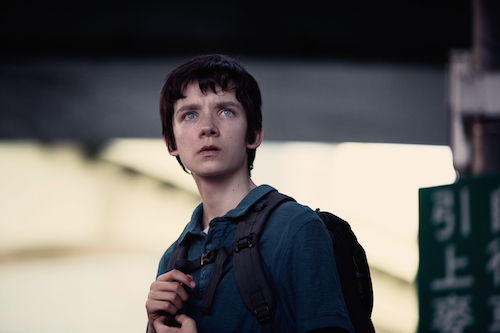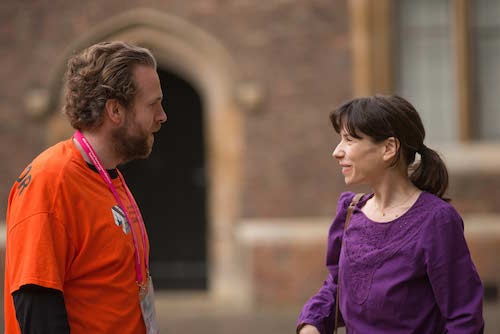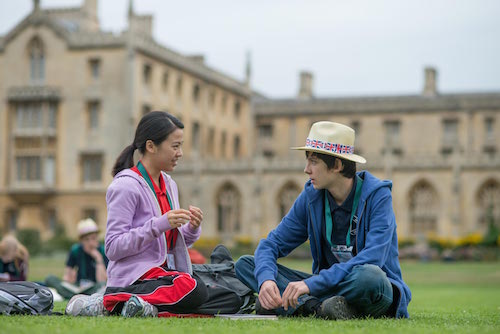A Brilliant Young Mind: Love and Math
The title of Morgan Matthews’ narrative film debut, A Brilliant Young Mind, immediately evokes Ron Howard’s A Beautiful Mind, and both films have in common a protagonist who is an exceptionally bright mathematician with mental challenges. Unlike John Forbes Nash, though, who suffered from schizophrenia, A Brilliant Young Mind’s Nathan Ellis is merely on the autism spectrum. And unlike Nash, he’s a fictional character, though the film is based on Matthews’ 2006 documentary Brilliant Young Minds, about British teens competing in the International Mathematics Olympiad.
Matthews, who has made several documentaries, does a solid job with his first fictional feature; the film is nicely paced and well-acted, with a lovely soundtrack and striking visuals. James Graham’s script is both sensitive and witty, including enough real math to be authentic without making the story incomprehensible to civilians.
Diagnosed with Asperger’s, nine-year-old Nathan (Edward Baker-Close) is told that he is unique by his dad, who explains, “You have special powers like a wizard and we’re just muggles.” One of Nathan’s “powers” is synesthesia, wherein he experiences one sense (sound) as another (color); he’s often distracted by lights and patterns. He’s also a math wiz. His mom Julie (Sally Hawkins) tries but cannot connect with Nathan the way his dad does. When the latter dies in a car accident, Nathan sinks further into himself, until he meets Martin Humphreys (the excellent Rafe Spall), a rebellious, dryly witty teacher at school who was once a math prodigy himself and understands Nathan’s preoccupation with the subject. Martin, who blames his multiple sclerosis for never having achieved his potential as a mathematician, takes Nathan under his wing; the two slowly develop a bond.
Flash forward to teenage Nathan (Asa Butterfield), whose obsessive behavior includes the need for prawn balls in a Chinese takeout order to add up to a prime number, or he won’t touch them. He’s clearly a handful for the soft, emotional Julie, whose infinite patience belies her exhaustion.
With Martin’s help, Nathan applies to the British Math Olympiad and is accepted to train in Taiwan for a spot on the UK team that will compete in the international competition. The other kids vying for the team come off a bit like the cast of a more sophisticated Big Bang Theory. Nathan is instantly uneasy; he isn’t comfortable with their quick banter and doesn’t get their jokes. When each English kid is teamed with a counterpart from the Chinese team, the lovely, friendly Zhang Mei (Jo Yang) enters Nathan’s orbit and shakes up his world.
UK team coach Richard (Eddie Marsan, another outstanding actor) knew Martin Humphreys back in the day. “It wasn’t his body that failed him,” he explains to Nathan. “It was his character.” In fact, Martin’s body is failing him more and more; we see him popping anti-depressants and refusing his shrink’s suggestion to join an MS support group. With Nathan away in Taiwan, Julie and Martin connect in their loneliness when she hires him to teach her math, hoping it will bring her closer to her son.
At training camp Nathan doesn’t join in the math-themed rap throwdowns or arguments; nor does he speak up in class. (Butterfield is great at conveying distress). Slowly Zhang Mei brings him out of his shell, as they wander around Taipei and he’s overcome by the lights and sounds of the city. (Matthews shows us what Nathan hears and sees; it’s often quite beautiful.) He finally gets up in class and demonstrates a problem to the applause of his classmates. “There’s rare beauty in your work, but you’re unfocused and unpredictable,” Richard tells Nathan, who is having a hard time with both math and relationships. As he and Mai become closer, he struggles to understand emotions.
Much of the movie is a build-up to the International Math Olympiad in Cambridge (including a classic slo-mo walk to the testing room), but the story is ultimately about the ability of individuals to connect despite major obstacles, as several characters eventually succeed in doing.
There’s a lot of heft to A Brilliant Young Mind, which narrowly skirts predictability thanks to a smart script, interesting characters and strong cast. Though several of its characters seem too good-looking to pass for true geeks, the film doesn’t try to pretty up the reality of people with serious challenges or the pressure to succeed for these kids, for whom failure is particularly devastating. As one notes, “If you’re not gifted, then you’re just weird.”
A Brilliant Young Mind opens Friday at Angelika Film Center.
—Marina Zogbi




